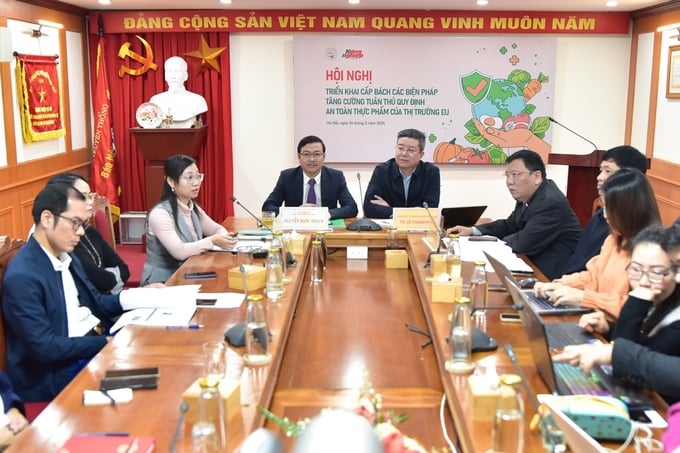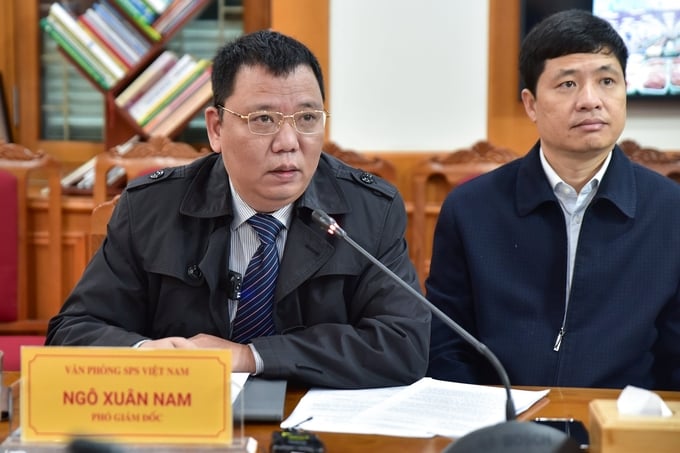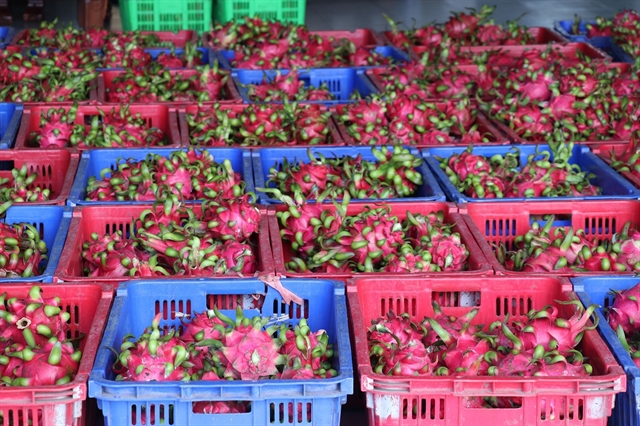May 25, 2025 | 04:59 GMT +7
May 25, 2025 | 04:59 GMT +7
Hotline: 0913.378.918
May 25, 2025 | 04:59 GMT +7
Hotline: 0913.378.918

Conference on the urgent implementation of measures to strengthen compliance with EU food safety regulations on Febuary 24. Photo: Tung Dinh.
According to the SPS Vietnam Office, in addition to the 114 warnings issued in 2024, Vietnam has experienced a surge in alerts concerning novel foods. Notably, in the first two months of 2025, the EU issued eight warnings regarding novel foods, with Vietnam accounting for four—equivalent to half of the total warnings issued globally. In 2023, the EU had not issued any warnings on novel foods for Vietnam; one warning emerged in 2024, and now the number has increased to four in merely the first two months of 2025. Moreover, this significant rise in warnings for novel foods is a worldwide trend. “Where novel foods accounted for only 0.8% of total warnings, they now represent 1.3%, and this rate appears to be on an upward trend,” assessed Deputy Director Ngo Xuan Nam of the Vietnam SPS Office.
When categorizing by risk, Mr. Nam noted the emergence of issues related to chemical residues (including pesticides and veterinary medicines), microbial residues, and residues from plant production agencies. In 2024, warnings for chemical residues accounted for 53.5% of cases, those for microbial residues in seafood comprised 50%, and warnings for plant production agency residues in plant-based products reached 68.4%. Regarding localities, the SPS Office reported that in 2024 Ho Chi Minh City received the most warnings (42, or 36.8%), followed by Hanoi (10), Tien Giang (9), and Khanh Hoa (7), among others. “According to the office’s report, the provinces and cities receiving the most warnings from the EU are those that have yet to respond to the plan for implementing the SPS Scheme as outlined in Prime Minister’s Decision 534,” Mr. Ngo Xuan Nam stressed.

Deputy Director Ngo Xuan Nam of the Vietnam SPS Office. Photo: Tung Dinh.
This situation has placed enterprises exporting agricultural and food products to the EU market at considerable risk. The market offers four remedial measures in response, the strictest being the recall and destruction of products. Product recalls, in particular, accounted for 21.9% of cases—with 25 out of 114 warnings handled in 2024—and in 2025 this rate increased to 56.3% (9 out of 16 warnings). Citing statistics from the Department of General Customs, Mr. Nam noted that the increase in warnings is not directly correlated with the growth in export value. In 2020, Vietnam exported approximately 2.91 billion USD worth of agricultural products to the EU and received 40 warnings. By 2022, exports had risen to 4 billion USD with 72 warnings, and in 2024 Vietnam set a record by exporting 4.21 billion USD, accompanied by a record 114 warnings. “Some contend that higher export volumes lead to more warnings; however, the growth in exports over four years has not even increased by fifty percent, while the number of warnings has surged by nearly 300%,” Mr. Nam analyzed. He also acknowledged that some have posited a “trade-off” during this phase of integration and export expansion. However, Dr. Nam argued that it is difficult to explain why an agricultural export giant—ranked among the world’s top 15—would be repeatedly warned in such a significant market.
As the focal point for receiving warning information from the WTO market, by February 20 the SPS Vietnam Office had processed 63 out of 114 warnings (55.3%), including 57 products managed by the Plant Protection Department and 6 by the Foreign Trade Agency (Ministry of Industry and Trade). The remaining 51 warnings (44.7%) from 2024 have yet to yield processing results.
Commenting on this issue, Dr. Nam observed that local management units remain inattentive to SPS-related matters. Additionally, the handling process has been sluggish; according to EU warnings, by February 20 only around 18 out of 63 provinces and cities (28.5%) had dispatched documentation to the Office regarding the implementation of Decision 534 for the SPS Scheme.

Commenting on this issue, Dr. Nam observed that local management units remain inattentive to SPS-related matters. Photo: VNA.
Nam in the opinion that the objectives of the scheme are “clear and direct,” aiming to address the challenges faced by Vietnamese agricultural exporters in a sustainable and equitable manner. For instance, the scheme sets a goal for 2025 in which the compliance rate with technical standards for agro-forestry-fishery safety is to reach 70%.
Additionally, nearly 100% of workers in food safety and plant and animal quarantine management at all levels are to be trained and updated annually in professional skills. Furthermore, 80% of the key items and markets are provided with guidelines for complying with SPS measures, and 100% of localities are expected to consolidate their focal points for market regulation inquiries. “The scheme aims to establish a national information portal on SPS, facilitating the exchange of market regulation information among cooperatives, businesses, associations, and management agencies at both local and SPS levels in Vietnam. This is an essential task for organizations, businesses, and individuals to promptly update themselves on new regulations,” Mr. Nam stated.
Looking ahead, Mr. Nam proposes several solutions, including enhancing information updates and disseminating new EU standards to producers (farmers, cooperatives, businesses) to ensure full compliance with regulations, particularly regarding hygiene, food safety, and epidemic prevention in the EU market. Specialized agencies advise the Ministry to provide detailed guidance on export procedures, labeling, and food safety certification for establishments involved in preliminary processing, processing, packaging, and agricultural production and export.
Nam also recommended enhancing inspections and strictly supervising the supply chain, material handling, production processes, preliminary processing, processing, packaging facilities, and transportation to ensure adherence to regulations on hygiene, epidemiology, and plant and animal quarantine measures. Furthermore, it is essential to tighten the use of plant protection agents, microbials, and chemicals in agricultural and fishery production; to enhance control at border gates; and to improve product inspections before export, thereby reducing the risk of rejections due to violations of EU regulations.

(VAN) The mutual export of agrifood products between the European Union (EU) and the United Kingdom (UK) must occur again without certification, border controls or other red tape. This was agreed at the UK-EU summit.
/2025/05/22/5121-2-173645_677.jpg)
(VAN) NBSAP Tracker identifies strengths and areas for improvement in the National Biodiversity Strategy, based on each region’s priorities and capacities.

(VAN) The draft amendment to the Circular on rice export trading stipulates a periodic reporting regime for rice exporting enterprises.

(VAN) Dong Thap farmers attained an average profit margin of 64% during the summer-autumn 2024 crop (first season), while An Giang and Kien Giang farmers followed with 56% and 54%, respectively.

(VAN) As a doctoral student doing research on renewable energy and electrification at Harvard University, the author shares his musings on electricity, nature, and countryside memories.

(VAN) The decree on Extended Producer Responsibility (EPR) ensures transparent management and disbursement of support funds, avoiding the creation of a “give-and-take” mechanism.

(VAN) Hue City rigorously enforces regulations regarding marine fishing and resource exploitation, with a particular emphasis on the monitoring of fishing vessels to prevent illegal, unreported, and unregulated (IUU) fishing.